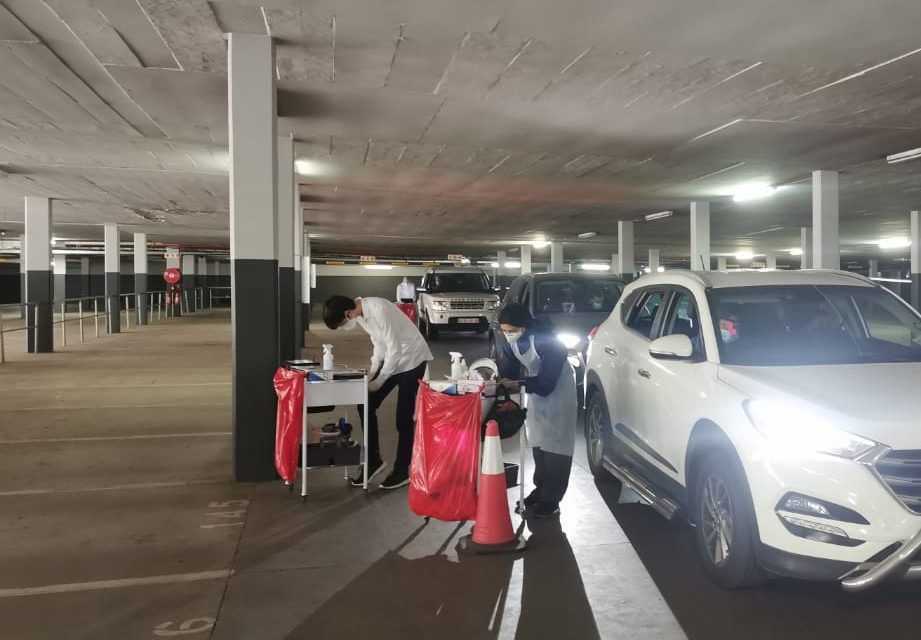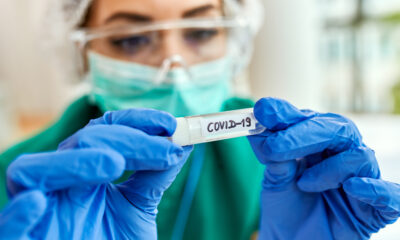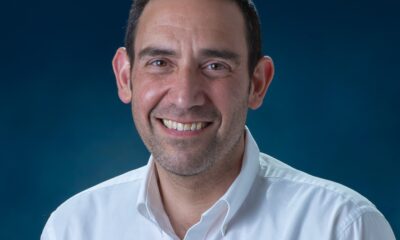
Featured Item

Not-so-festive: parties cause COVID-19 spike in community
Published
3 years agoon
Back in March, COVID-19 was brought into the heart of the South African Jewish community because of a party held thousands of kilometres away. At that time, many were unaware that a pandemic was even a possibility, but now, with the losses so many have endured, parties have once again contributed to a rise in COVID-19 cases.
A small gathering of university students has led to about 40 Johannesburg Jewish families going into quarantine, and parties celebrated over Sukkot and Simchat Torah have further added to the spike in cases. In its newsletter on Friday, 16 October, Hatzolah reported 31 new cases that week, and 52 active cases in the Johannesburg Jewish community.
Professor Barry Schoub confirmed to the SA Jewish Report that one particular function “became a super-spreading event, transmitting the infection into families of the participants”. Schoub is emeritus professor of virology at the University of the Witwatersrand and the former director of the National Institute for Communicable Diseases.
A letter was sent to the community by Chief Rabbi Dr Warren Goldstein, the South African Jewish Board of Deputies, and leading health professionals saying that these new infections included “a number of hospitalisations”. The letter went on to say that “the majority of these cases may have come from private social gatherings and not from shuls or schools. We urge our community to be extra vigilant at this time so that the increases we are seeing don’t develop into a full-blown second wave in the Jewish community.”
Dr Anton Meyberg, a top Johannesburg pulmonologist operating from the Netcare Linksfield Hospital, said, “The impact has been dramatic and massive. We are definitely seeing it in the hospital already. I wouldn’t call this a ‘second wave’ as we are still seeing more than 1 000 cases a day in the country, so we’re still in the first wave.
“I would say that parties where people were irresponsible in their behaviour precipitated an upsurge in the community. This led to a ‘mini lockdown’, and multiple people have been admitted to hospital. If people don’t wear masks and don’t follow guidelines, these are the ramifications. You can’t entirely blame 22-year-olds – they need to be responsible, but they don’t always fully understand the ramifications of their actions.
“People have become lax in their actions, and I understand it isn’t always easy, but this surge has shown that people cannot let their guard down and that social gatherings need to follow proper protocols. This isn’t just about protecting yourself, but your whole community.”
He believes the upsurge has been “nipped in the bud”, and is hopeful that it won’t affect matrics writing exams or lead to increasing numbers in the Jewish and wider community. “My only hope is that people learn from this, and take it forward.”
Another health professional in Johannesburg, speaking on condition of anonymity, said it was thanks to Meyberg’s quick response that the surge had hopefully been contained. “He put at least 40 families into quarantine,” the professional said.
A community member, also speaking on condition of anonymity, said the upsurge created “quite a bit of mayhem, as families had to be split up, and people generally got a big shock”.
She said she knows that the university students’ gathering wasn’t a “wild” event, and that the young people involved are responsible, upstanding members of the community who may have felt their party was safe because it was a gathering of fewer than 10 people.
This can be compared to the more than 80 positive cases in Cape Town after a cheap drinks event at the club Tin Roof. At the time of writing, the Jewish community hasn’t been affected by this “super-spreader” party, but it could have been. “This kind of upsurge is happening in many communities, not just ours,” she says.
The Community Security Organisation in Cape Town has warned people not to become complacent. It reported that its COVID-19 monitoring programme had six COVID-positive community members in the first two weeks of September, but this doubled to 13 COVID-positive cases in the first two weeks of October.
“All over the world, second waves involve younger people and university students more significantly than the first waves,” said Johannesburg pulmonologist Dr Carron Zinman. But, she pointed out that “We aren’t out of the first wave, and this isn’t even the beginning of a second wave.” She believes there will “definitely” be a second wave, as no other country has managed to avoid it.
“We can’t assume anything at this stage. We need to take this as a learning exercise, to remind us what this virus can do,” she said. “We aren’t saying you can’t socialise, but it has to be done in a different way now.” She reminded the community that people are still getting “desperately ill, struggling with every breath, and dying from this disease”.
Doctors are clear that although community leaders and institutions have poured massive amounts of funds, time, effort, and brainpower into keeping shuls and schools safe, if people drop their guard at home or at social events, the virus will still spread in the community.
Hatzolah’s Darren Kahn said the increase in positive cases fits the ebb and flow of the virus that the organisation had witnessed since the peak, and there was a similar spike after Rosh Hashanah. “We are more concerned for the week ahead, to see the effects two week post-Sukkot,” he told the SA Jewish Report.
“There has been some confusion as to the duration of the quarantine period, and whether quarantine is necessary for people who have previously been infected or have had a positive antibody test,” said Schoub. “At present, the durability and effectiveness of immunity after infection is unclear. It’s also not known whether the persistence of symptoms – the so-called “long COVID” – is a sequel to the original illness or a second infection.
“There does appear to be long-term immunity following more severe coronavirus infections such as MERS and the original SARS of 2003. However, immunity following infection with the common-cold coronaviruses is short-lasting and ineffective, as is the case with many other human respiratory infections.
“Studies of protective antibodies following COVID-19 infection haven’t been definitive, with milder cases having only short-lived and low levels. The antibody tests performed in routine clinical laboratories aren’t for neutralising antibodies, and may well not indicate protection. Indeed, some of the proven second infections have turned out to be more severe than the first illness. A further public-health concern is that second infections could further spread the virus.
“Regarding the timing of quarantine – 14 days is based on the upper limit of the incubation period of the infection,” he says. “The majority of infections do take place before 10 days, and the South African health department took a decision to reduce the quarantine period to 10 days for convenience of messaging. However, 14 days remains the period recommended by most international authorities, and should be generally adhered to wherever possible.”










